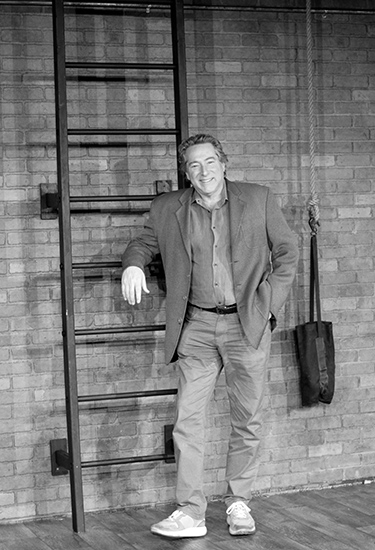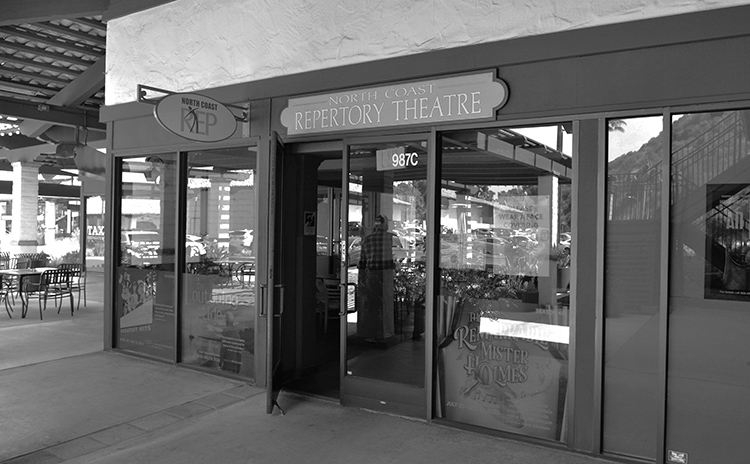David Ellenstein’s grandfather, Meyer Ellenstein, was a two-term mayor of Newark, New Jersey. David’s father, Robert Ellenstein, was an actor who appeared in television, movies and stage productions. Politics and acting were in David’s bloodline. So, I asked, “You never had a yen to go into politics?”
“Well, I’m an artistic director so I can’t say that is 100 percent true,” Ellenstein responded. “I run a theatre. There is a lot of politics involved in that. As an actor and a director, maybe not as much. But as an artistic director, there is definitely an element of politics.”
He is the decision maker at the North Coast Repertory Theatre, although his wife, Denise Young, may be the bigger decision maker in his Carlsbad home. Ellenstein recalls the circumstances of his taking the job at the North Coast Rep. “My wife and I were living in Los Angeles,” he recounted. “I was working at the Coconut Grove Playhouse (Miami, Florida), the Paper Mill Playhouse (Milburn, New Jersey) and the Alabama Shakespeare Festival (Montgomery, Alabama) and going all over the place. I was out of town six months of the year and my wife goes, ‘This isn’t working!’ They called me about the opening at North Coast Rep down in San Diego, where I had directed before. They said, ‘You should apply for this; you would be great.”

However, Ellenstein initially had his doubts. “I said to my wife, ‘Ehhh, you remember that little, tiny theatre in the back of a shopping center? We would have to move down there. I would have to professionalize the company. I would have to turn it into an equity theatre.’ She goes, ‘You’re applying. You’re getting it, and we’re moving!’”
That settled, David and Denise relocated in 2003 to San Diego County.
“I believe the arts in general are all about uplifting human beings and making the world better for having experienced them,” Ellenstein told me. “I’ve always believed in a wide variety of genres, and I like to do all kinds of plays – new plays, old plays, dramas, comedies, musicals, avant-garde plays. I also have to take into account the audience that comes to North Coast Rep, where we are located, the size of our venue. We draw mostly from North County Coastal, which is mostly affluent people who are of a certain bent. I can put on all kinds of plays, but I have to be careful that I am not using a sledgehammer. I have to serve it with a little sugar, as it were. I make sure that if I am going to ask them to take a journey that they may not be comfortable with, that I am also holding in the other hand something that they are going to be comfortable with, so that we move slowly down the road.”
When I interviewed him in late February 2022, Ellenstein commented that “I am in rehearsal right now for Harold Pinter’s The Homecoming which is a brutal comedy of menace, which has been troubling to certain kinds of audiences for a long time, ever since it was written. But I love it, love Pinter, and that is about 60 percent of the audience, and then 40 percent of the audience doesn’t quite get it. I think it is a great theatrical piece that I find extremely funny, extremely unsettling, and so we are doing it.”
The 1964 play features five male and one female character. Though “Ruth” is married to “Teddy,” his brothers “Lenny” and “Joey” compete for her sexual favors, as does his father “Max” to a lesser extent. His uncle “Sam” remains relatively aloof, his memory of Max’s late wife “Jessie” stirred by Ruth’s libertine ways.
Before and after The Homecoming, Ellenstein scheduled the musicals Desperate Measures and Forbidden Broadway. The first is an updated and comedic rewrite of Shakespeare’s Measure for Measure; the second humorously lances Broadway shows and actors. “We are kind of sandwiching the more adventurous things between two things that are more generally acceptable,” Ellenstein explained. “That’s the way I do it. My dad used to say that every time someone goes to the theatre, it should be a surprise. I try to mix it up as much as I possibly can. If they see a drama, the next one is a comedy or a musical. If they see a classic, then the next is a new play.”
His “dad,” Robert, was a huge influence on Ellenstein’s life and career. “When I was four, I saw my dad in a production of Irma La Douce with Juliet Prowse, which he did all over the place. And I just went, ‘That’s what I want to do! That looks like too much fun!’”
Ellenstein’s father “was my number one teacher, inspiration, and influencer. As much as he said, ‘Are you crazy” Do you really want to go into this crazy business when you see how hard it is, what I have to go through?,’ he was really glad that I did.”
Ellenstein said that as a boy, he accompanied his father to “lots of TV sets and movie sets and live theatre rehearsals as well. I would go to observe, and he would introduce me to everyone. He would always make a point of making sure that everyone knew that I was there and that I was his son and making sure that I had a good spot to watch from. I got to meet everybody when I was a kid because my dad was also a member of the Academy (of Motion Picture Arts and Sciences). We would go to the Academy theatre to see all the movies. I would go often with him, and I met everybody, every star that you can imagine I met as a kid.”
Cary Grant made quite an impression on young Ellenstein, but more influential in his life were Leonard Nimoy, who was “best friends” with his dad, as well as Ed Asner, who “was in my dad’s theatre company in the 1960s.”
Ellenstein began acting in elementary school. “I wrote and directed the play that we did as a culmination of sixth grade, which was called Dr. Livingstone, I Presume. I also played Dr. Livingstone. And then I played the stage manager in junior high school in Our Town and Mercutio in Romeo and Juliet. At Horizons High School, I did about 12 plays, but I grew up going with my dad when he was the first artistic director of the Company of Angels in Los Angeles. And then he started a theatre company in Los Angeles called the Los Angeles Repertory Company in the ‘60s and I went to every play that they did.”
His first professional part as an 18-year-old was a single line in the 1976 miniseries, Once an Eagle, based on a novel by Anton Myers. “Glenn Ford was in it and Amy Irving when she was very young. I played a World War I soldier who told an officer that ‘Colonel Bannerman wishes to see you immediately, sir.’” Eighteen months later, he received an equity card, and took small parts on such television series as Eight in Enough and General Hospital, “nothing very memorable.”
A particular thrill for him was acting with his father in Star Trek IV: The Voyage Home which involved the crew of the USS Enterprise time traveling from 2286 to 1986 San Francisco, where they needed to capture a humpback whale, because that species had become extinct in their time. The whale’s call was needed to respond to a signal that was disabling the global power grid of the 23rd century. Ellenstein’s father played the role of the President of the United Federation of Planets. Nimoy, who directed the movie in addition to reprising his role as Spock, cast Ellenstein as a young doctor, who was baffled when Dr. McCoy used futuristic medical technology to cure a patient at a San Francisco hospital. “She grew a new kidney!” his character exclaimed in amazement.
While that was the first movie in which they both acted, “we did many plays together,” Ellenstein said. “He directed me in plays; I directed him in plays.” Once Ellenstein reached adulthood, they had “a very respectful and open relationship. We could say anything to each other. We did a production of Hamlet in Los Angeles where I played Hamlet and he directed it. It was a successful version of it. We won all kinds of awards, and we did it three separate times from 1987 to 1994.”
“We would sit in his living room, and we would go through the script, and we would talk about the play,” Ellenstein recollected. “What I realized later – I don’t think he consciously realized it and I certainly didn’t, but looking back on it – he was actually handing over to me everything he knew about theatre and acting, and actually about life, in that year that we sat together. He was really being the father with the son apprentice and passing on the trade, as it were, to me. It was great. That Hamlet production is probably up there with the very top highlights of anything I have ever done. It was really good.”
After his father died and was cremated in 2010, Ellenstein developed a custom of taking him “on stage with me” whenever he was acting. “I have taken a little bit of his ashes and put it in a little baggy. I put it in my pocket. His ashes have been on stage with me every time I have performed since he died. It helps me. He is with me.”
Ellenstein also likes to ruminate before shows he acts in. He thinks not only about his father, but also about “other people who have been mentors, who I have admired in my life. I try to guide their spirits, as it were, to go with me so that I can do my best.”
Discussing his family, Ellenstein proudly pointed out that his grandfather was, to date, the only Jewish mayor in Newark’s history. He served from 1933 to 1941. “He had been a dentist, a lawyer, and the police commissioner for a while, and then mayor for eight years,” Ellenstein said. “He died when I was about 10 years old. What I remember most about him was him taking me to get ice cream in Beverly Hills at Wil Wright’s Ice Cream Parlor. I loved Wil Wright’s. They gave you little almond macaroons with your sundaes. What could be better?”
Later in life, he learned stories about his grandfather, who was a “big, gregarious, handsome guy. A Golden Gloves boxer too. He was quite the personality. FDR (President Franklin D. Roosevelt) had this thing he called the Council of Mayors, which he would meet with every other month. My grandfather was part of that. He would go to Washington every two months to meet with him.”
Growing up in a secular Jewish family, Ellenstein neither attended synagogue nor did he have a bar mitzvah, although one rabbi told him that just by turning 13 and having Jewish parents, he was a son of the commandments, whether he knew it or not.
“All the values of Judaism I certainly subscribe to and certainly have a great connection with Jewish people when I meet them, Ellenstein said. “I am immediately accepted, and I immediately accept them, just because. I am affiliated that way, but I am not a religious Jew.”
He has directed over the years various plays with Jewish themes. “Part of that is by design and part of that is when I was coming up in my career, as an actor too, because my name is David Ellenstein, they’d call me to read for Jewish roles. I got cast in a lot of Jewish plays.” Similarly, as a director, “I would get asked to direct Jewish-themed plays. So, I got to know them well. I’ve learned most of what I know about the Jewish religion from doing plays. I’ve learned prayers, history, about the conflicts. I haven’t studied besides that, except for the research that I would do for the plays. I’m kind of steeped in Jewish knowledge because of all the Jewish theatre that I have done.”
Ellenstein’s mother, Lois, was 95 at the time of our interview and living in a memory care facility in Oceanside. She had a master’s degree in education. After her children were born, she focused on being a mother. She briefly had a catering business which she ran out of the house. “She was a great baker,” Ellenstein said. For nine years prior to moving to Oceanside, Lois Ellenstein lived with her son and daughter-in-law.
Ellenstein’s older sister, Jan, teaches painting, drawing and sculpture to children in classes throughout the Chicago area, whereas his younger brother, Peter, is also in the theatre. “He was the artistic director of the William Inge Theatre Festival in Kansas for about 15 years,” Ellenstein said. “He has taught in universities and now he is freelancing up in L.A. He comes down and sees the shows at the North Coast Rep.”
Currently Peter is working on Eisenhower, This Piece of Ground by Richard Helleson, “with whom my brother is very friendly and who I have known as well.” John Rubinstein, who won a Tony Award for his performance in Children of a Lesser God gave a dramatic reading of the play at the North Coast Rep.
Among Ellenstein’s friends is actor Richard Dreyfuss, who now lives in Encinitas. The two have worked together on small projects, but “I haven’t had him in a full run of a play yet.” For well-known actors such as Dreyfuss, a gig at the North Coast Rep could disrupt the timing of their careers. “You figure it is 4 ½ weeks of rehearsal and 5 weeks of run, so it is a commitment of 9 ½ weeks. It is a big commitment, especially because we don’t pay what Hollywood pays. It is hard to get people to block that time, or even an actor who works on Broadway. We can’t pay what they can make on Broadway or on a national tour. So, they are locking themselves up; it really has to be something that they want to do.”
While Hollywood stars may be too expensive for the 194-seat North Coast Rep, Ellenstein is able to attract actors from regional theatres throughout the country. He had directed many of them, and he delights in introducing strong actors to his local audiences. A drawback, however, is that they need to be lodged at local hotels, which can tax the small theatre’s budget. Luckily, Ellenstein has a talented pool of local actors as well whom he can regularly cast. Among regulars are Richard Baird, Omri Schein, David McBean, Jackie Ritz, and, until she opened The Backyard Renaissance Company, Jessica John.
A small theatre, with fewer than 200 seats, is both “a blessing and a curse,” Ellenstein commented. “It’s nice to have full houses. It is not nice to be in a big theatre where you have only a half or a third of the house. Before COVID-19, we were full almost every performance, which was fantastic. Our subscriptions filled over half of our houses. We only had to sell less than half the tickets to be full.”
His audiences love the intimacy of the small theatre, Ellenstein said. “You are never more than seven rows away and it feels like you are right up there with the actors. People really like that.” On the other hand, Ellenstein has tried without success to find a larger venue, for perhaps 320 people. “We would keep a second space, maybe our current space, to be used for more experimental things and our theatre school. That is the one thing that I haven’t been able to accomplish. We’ve almost gotten there a couple of times. It is not for lack of ability to raise funds; it is all about location. To be comfortable for our audience, we need to stay in the North County coastal area from Carmel Valley through Encinitas to Carlsbad. That is really our area west of El Camino Real. We have almost gotten there a couple of times but then the deal has fallen through for one reason or another.”
If he had a larger venue, he said, “It would change how I select plays. I could select plays that require two-story sets. I could select plays with larger casts. I could conceptually look at how we design the plays differently. I am so lucky that I have Marty Burnett who is our resident set designer. He has done more than 200 consecutive productions at our theatre. He knows our space backwards and forward. We do things in there that we shouldn’t be able to do in that building given our limitations.”
Burnett’s shop is in Carlsbad, “where he builds things and then he brings them down to our rehearsal space because there is no storage in the shop,” Ellenstein said. “He sets them up in the rehearsal space, so we rehearse with the things he is building for the next show. Then when the show in the theatre ends, that gets struck, and the one in the rehearsal spaces moves out into the theatre.”
The rehearsal space is across the parking lot from the theatre at 987 Lomas Santa Fe, which is within the Loma Santa Fe Plaza. “We have the theatre, office spaces, rehearsal space, and theatre school there,” Ellenstein said.
Ellenstein and his wife met in 1989 when he directed Denise in a play. From acting, she moved over to the production side as a model maker and in the art department. Then Denise got into the web design and development business, which took off and occupied her for 25 years. Eventually, “she was tired of doing that, sick of sitting at her desk with her computer and working with clients remotely. She really wanted to do something where she would get back out and deal with people. She is very good at what she puts her mind to. She had a catering business in L.A. too. She catered for the Getty Museum and Jodi Foster and then, when it was really taking off, she went, ‘You know, I don’t want to do this.’”
Now, Denise works as the development director at the North Coast Rep. “Our managing director Bill Kerlin and my board of directors wanted her to doit,” Ellenstein said. “I was very trepidatious about working with my wife at the office and then coming home together, but, you know, we are on different tracks there, so it has worked out well.”
The couple has two sons: Jamie, who at the time of the interview was a sophomore at UC Santa Barbara, and Will, then a senior at Carlsbad High School.
Are either of his sons likely to go into the family business of the theatre?
“Jamie is a computer engineering major, but he is also a classical piano player and a basketball player,” Ellenstein said.
Like Jamie, Will doesn’t seem to be very interested in a theatre career. Instead, he is “very much into water polo and speech and debate. He has won a bunch of tournaments.”
With those skills, it sounds like Will cold be channeling his great-grandfather Meyer, the former Newark mayor. In a corollary of what Ellenstein told me at the beginning of this interview, in politics, there is a great deal of acting too.
Republished from San Diego Jewish World.


























